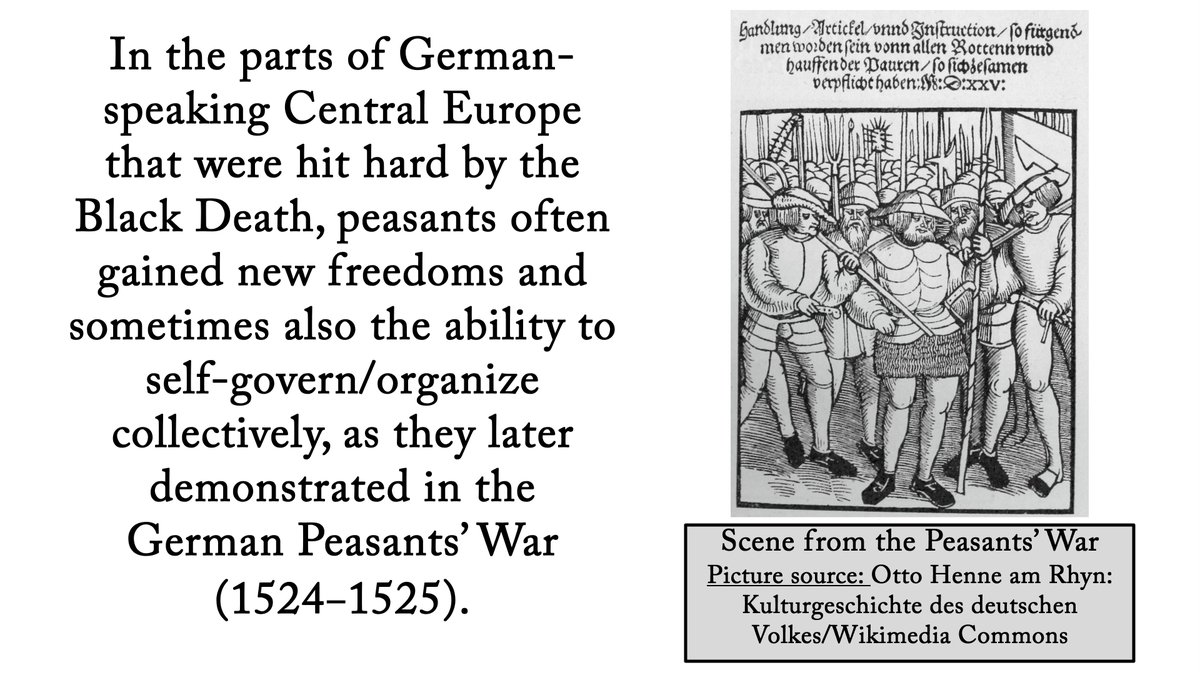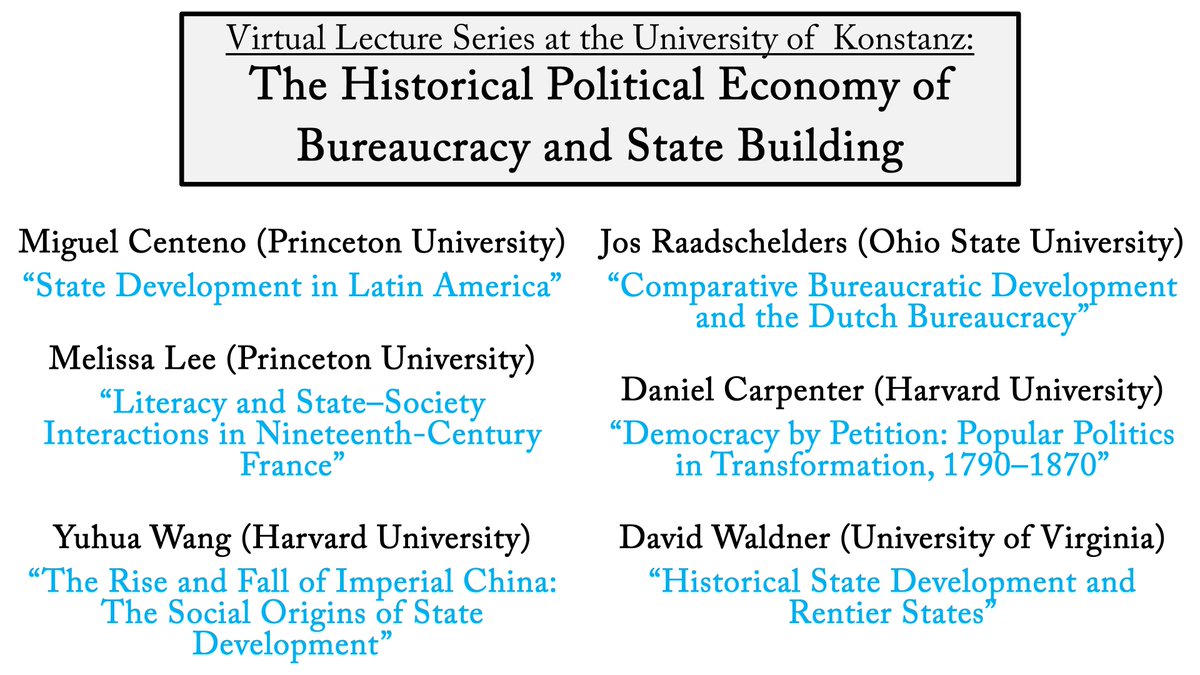🚨 What are the political consequences of pandemics? 🚨
D. Gingerich & I analyze history’s deadliest #pandemic in a brand new @World_Pol article: “Pandemics & Political Development: The Electoral Legacy of the #BlackDeath in Germany”
doi.org/10.1017/S00438…
#polisciresearch 🧵
D. Gingerich & I analyze history’s deadliest #pandemic in a brand new @World_Pol article: “Pandemics & Political Development: The Electoral Legacy of the #BlackDeath in Germany”
doi.org/10.1017/S00438…
#polisciresearch 🧵

Brief summary (#TLDR): The Black Death (BD) had a significant long-term impact on Germany’s political development. Hard-hit areas introduced proto-democratic institutions; sustained experiences with participative government later helped reject antidemocratic & illiberal parties. 

Long overview (starting here): In 1347, Europe was hit by a pandemic that killed 30–60% of its population: the BD. It had a major impact on medieval society which was based on feudalism/serfdom. Yet the BD’s impact varied greatly across space, leading to divergence in its impact. 

Theory summary (1): In areas hit hard by the BD, labor scarcity made serfdom (a form of labor coercion) untenable. Labor bargaining power increased, socioeconomic relationships were restructured, elites weakened, & the emergence of proto-democratic institutions became more likely 

Theory summary (2): In areas hit less hard by the BD, labor coercion was maintained and there was no restructuring of socioeconomic relations. An elite-dominated, unequal agricultural economy stayed in place, and the emergence of proto-democratic institutions remained improbable. 

Ultimately, this fundamental divergence in political-economic equilibria—one with greater equality & proto-democratic institutions, another one with higher inequality & no such institutions—shaped the prospects of different political forces during the transition to mass politics. 

Parties representing the interests of traditional elites (seeking to undermine democracy & maintain a hierarchical social order) were successful in areas that had no experience with democratic engagement. Yet in areas that had a history of democratic engagement, they were weak. 

Case: Germany is the ideal case to study the BD’s long-term consequences for two reasons: (1) significant regional variation in intensity (east only hit lightly) & (2) decentralized political organization until 19th century, allowing for survival of local political institutions. 

We develop a new measure: the BD Exposure Intensity (BDEI) score. It is high for any location “X” if X was close to many recorded outbreaks (& those had high mortality rates). Thus, BDEI score can also be understood as showing how close X was to the pandemic’s “center of gravity”
Analyzing long-term outcomes in 19th-century Germany, we find that areas with lower BD intensity have (1) higher land inequality, (2) higher Conservative Party vote shares (representing traditional elites), and (3) more electoral disputes (related to intimidation/coercion/etc.). 

Additionally, we test if the fundamental divergence in political-economic equilibria caused by the BD and observed in 1870s Germany can also help explain variation in Nazi vote shares in the Weimar period. We find that the equilibria were still visible in the 1930/1932 elections. 

We also study changes in proto-democratic institutions from 1300 to 1500 and find that higher BD intensity led to the adoption of participative elections in medieval towns. Moreover, we find evidence for lasting changes in socioeconomic development in early 19th-century Prussia. 

In sum, the BD had a significant, long-term impact on Central Europe’s political development. Areas hit hard by the BD introduced proto-democratic institutions & sustained experiences with participative government helped reject antidemocratic parties in the era of mass politics.
Our results are not only important to understand Central Europe’s development. Germany’s conflict between democratic & authoritarian forces (clearly linked to the divergence caused by the BD) was associated with the rise of the Nazis & led to the darkest episode of world history. 

Here is a video summary of the study: janvogler.net/PPD_Vid.mp4. Please feel free to reach out if you have any comments. Also, if you plan to discuss the article with your students, I can offer to join virtual seminars & provide answers to questions that come up in the discussion. 

For support & opportunities to present the study we thank @UVADemocracy @PoliticsUVA @CLEARLabUVA @DukePoliSci @soweps_research @fhollenbach @MedianVoter @MigrationNerd @thwillow @PeterRosendorff @SJRickard @liviaisabella13 @rmmyrick91 @APSA_Preprints @CUP_PoliSci @cambUP_History
We thank everyone who gave us comments (details below)! This 🧵 might be of interest to @uvavpr @uvamadcap @GlobalUva @UniKonstanz @EXCInequality @matisaksk @BlogBroadstreet @KingsQPE @CESCritEuro @EllenOchs @MelodyCBarnes @Soccerpolitics @econhistorian @on_germany @electsystblog 

Article Download: doi.org/10.1017/S00438…
#PoliSciTwitter #democracy #pandemic #History #Germany #polisciresearch #Europe #BlackDeath #medievaltwitter #PoliticalEconomy #HealthEcon #covid19 #EconTwitter #ElectionTwitter #PandemicPolitics #EpiTwitter #twitterstorians
🧵 end 🙂
#PoliSciTwitter #democracy #pandemic #History #Germany #polisciresearch #Europe #BlackDeath #medievaltwitter #PoliticalEconomy #HealthEcon #covid19 #EconTwitter #ElectionTwitter #PandemicPolitics #EpiTwitter #twitterstorians
🧵 end 🙂
You can find 2 summaries of our @World_Pol article (doi.org/10.1017/S00438…) in new blog posts!
For the Washington Post's @monkeycageblog, we wrote the following post: washingtonpost.com/politics/2021/…
And for @BlogBroadstreet, we wrote this one: broadstreet.blog/2021/06/11/how…
#polisciresearch
For the Washington Post's @monkeycageblog, we wrote the following post: washingtonpost.com/politics/2021/…
And for @BlogBroadstreet, we wrote this one: broadstreet.blog/2021/06/11/how…
#polisciresearch
• • •
Missing some Tweet in this thread? You can try to
force a refresh








